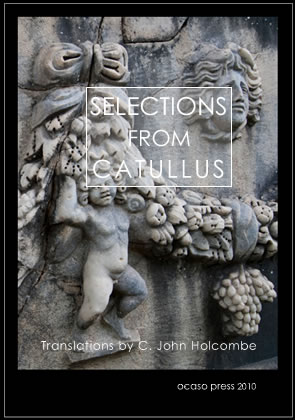Selected works of Catullus: decent verse translations as a free pdf
ebook with introduction, notes and bibliography.
Gaius Valerius Catullus was born in Verona around 84 BC. His father was
wealthy and distinguished, owning a villa at Sirmio, and entertaining
Julius Caesar when the great man was governor of Gaul. The poet went to
Rome in 61 BC, where he fell in love with the 'Lesbia' of his poems,
very probably Clodia, a member of the aristocratic Claudian family and
the wife of Q. Caecilius Metellus Celer. The fascinating but rapacious
woman soon tired of her young lover, but he worked his rapture and
despair into some of the finest of Latin poetry.

In 57 BC Catullus went to Bithynia on the staff of Memmius, governor of the province. On his return a year later he probably travelled via the Troad to perform burial rites for his brother, who had died on service in the east. Thereafter the poet seems to have lived in Rome, in comfort if not luxury at his villa near Tibur, which is modern Tivoli.
Many acquaintances are mentioned in his poems, but we know very little
of his everyday life. By 54 BC he was probably dead.
Catullus belonged to the 'neoteroi' or new
Roman poets drawing inspiration and technique from Alexandrian Greek
models. The 114 poems extant derive from a single manuscript, and are
very mixed, ranging from the witty, brilliant and moving, to the
indifferent and unnecessarily obscene. Their arrangement seems an
editorial convenience. The first 60 are lyrics in various meters. Poems
61-4 are long pieces modelled on those of the learned Greek
scholar-poets of Alexandria. Poems 65-116 are in the elegiac metre but
epigrams, i.e. short poems on a wide variety of topic. Adding to the
confusion of this unhelpful grouping is the very uneven quality of the
work. For long sections Catullus can write with searing brilliance, but
many poems are trivial and overcharged with obscenity or bluntness of
humour that is more Roman than ours.
A collection that contained only the first
rate would be a slim volume, and I have therefore adopted a policy
that:
. includes the celebrated pieces,
. displays the range of the poet's work, which extends to some
indifferent poems,
. renders chosen poems in their entirety, generally translated line for
line,
. reworks the original into decent English verse, occasionally adding
shaping features not found in the original,
. groups poems into coherent themes.
The policy selects only one third of poems, but two thirds of the text.
Some renderings are a little free, but Catullus is not a poet that can
be always translated word-for-word, and his language is not generally
that of contemporary speech. Today there are many translations in the
current style of free verse that follow a more literal approach, but
the translations here are rendered in a terse iambic to bring out their
essential poetry.
Click here for the free pdf e-book.
Carmen 1
Whom else could I present little book
to, all the roughness pumiced off
but you, Cornelius, once kind enough
to think these little trifles worth your time?
You — whose three great books, of all Italian work,
display the wisdom of mankind:
the fruit of Jupiter and endless toil -
I ask to take this effort as your own,
when, so protected by the virgin Muse,
it may then live, and last, more lives than one.
Note
Cornelius Nepos (c. 94-24 BC) was famous for his historical works, but
also wrote light verse. The dedication may well have introduced the
collection in the original manuscript, and is written in the
hendesyllabic metre (eleven syllables, divided into five feet).
Carmen 5
Let us live, my Lesbia, in our love
despite what fierce old men will say. For us
their ancient saws may count as nought. It's true
the sun that sets today will rise again,
but once its transient light is spent
there comes enforcement of an endless night.
So give me then a thousand kisses, give
a hundred thousand, hundred more. Heap on
those brief confusions that continually
the many senseless things we may have done
are lost in one, and therefore never spell
the whole — for then an evil eye may count
the sum, and curse us with what kisses were.
Note
A famous piece, written in the hendesyllabic metre, and here a little
freely rendered in the last half.
Carmen 31: Sirmio
Dearest of islands and peninsulas
of standing waters or the boundless seas -
for both the glittering sea god Neptune holds -
how willingly, Sirmio, I come to you.
I scarce believe I've left the plains of Thynia
and Bithynians to safely reach you here.
What blessedness to lay aside old cares,
and come, mind burdened with its travelling,
at such a cost, wearily, to our own home,
and take again our ever-longed-for bed,
alone the recompense for all our toils.
So hear me, Sirmio, and let your joy
replenish mine, and laughing Lydian waves
repeat the raucous laughter in this house.
Note
Another celebrated piece that has been much translated and adapted.
Sirmio is modern Sirmione, an isthmus projecting into Lake Garda, where
Catullus's father owned a villa. Original in the choliambic metre.
You may be interested in other Ocaso Press publications, all graceful translations with facing Latin, Introduction and Notes in free
pdf format:
Odes of Horace
Virgil's Georgics